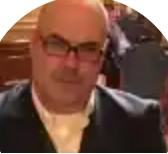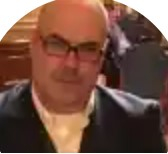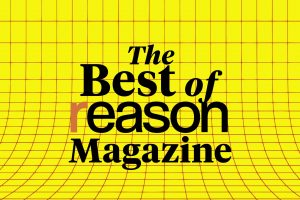
Jeff Kowalsky/AFP/Getty
With the little free time he has as mayor of Dearborn, Abdullah Hammoud is often glued to his phone fielding WhatsApp messages from family members with updates from Lebanon. He, like many Lebanese Americans, is trying to get loved ones out of the country after Israel’s recently expanded military offensive. Last week, Israeli airstrikes killed an American citizen in Lebanon who was from Dearborn.
In normal times, Hammoud is no stranger to the national press, often fielding interviews from reporters to speak about how the broader Middle Eastern and North African community in America is feeling. Dearborn is home to the largest Arab American community in the country and the largest Lebanese American one, too. Since the war began in Gaza, political analysts, pollsters, campaign officials, and journalists are keeping close tabs on his city, trying to gauge how voters will show up—or not—this November.
In 2020, President Biden won the crucial swing state of Michigan by 154,000 votes. With an estimated 220,000 voters who identify as either MENA or Muslim in Michigan, Dearborn serves as a useful proxy for thinking about the anger and frustration many feel about Biden’s policies in the Middle East. The White House becomes much more difficult without the support of Mayor Hammoud’s city.
The Harris campaign has done little to win back the support of Hammoud or his constituents. The initial wave to get Biden off the ticket started in Dearborn in February. Mayor Hammoud penned an op-ed in the New York Times throwing his support behind the Uncommitted campaign over the Biden administration’s unwavering support for Israel.
In that letter, Hammoud said that he and his neighbors felt betrayed. Months have passed, and President Biden is no longer on the ticket. Mayor Hammoud spoke with Mother Jones about whether that feeling has shifted, his advice to the White House, and the problem with thinking of people in Dearborn as simply pawns in the 2024 election.
This interview has been edited for length and clarity.
President Biden is no longer the candidate. But Israeli bombs are still dropping in Gaza and now in Lebanon, Yemen, Syria and Iran. How are you feeling now?
It’s getting all the more personal. Although we have many residents that have lost lives in Gaza, it seems that now—more than ever—we have funerals that we’re attending on a daily basis for loved ones that we’ve lost overseas. And so, how much has changed? The feeling of betrayal still exists. This idea that our administration, the leaders in this country have chosen [Israeli Prime Minister] Benjamin Netanyahu over the American people still persists. And I think it’s not just the feeling that Dearborn residents carry, but it’s the feeling that the broader American public carries.
This week, thousands of people showed up at the funeral of Dearborn resident Kamel Jawad, who was killed in an Israeli airstrike in Lebanon. He was an American citizen who was in Lebanon trying to help those who were unable to flee. How is your community handling that loss?
I’ve been to many funerals in this community. But this, this was very different.
It was much quieter. A lot more solemn. The grief was physically visible on so many, not just the family and close friends, and it’s because everybody knew somebody that had died or been injured or displaced or that they haven’t been able to contact.
Dearborn is the subject of a lot of national election coverage. What is something that is either underreported or overreported?
What people often miss is they believe that this community only cares about foreign issues and global issues. That could not be further from the truth. As somebody who grew up in the post-9/11 era, we have not had alignment on a foreign policy agenda with any other presidents for the last 20 years. And so, for as long as I can remember, the community has made issues of foreign policy and global policy secondary. What you’re hearing now is people saying enough is enough, and the genocide is unprecedented.
What they’re saying is we care about universal health care and we care about what’s unfolding in Gaza. We care about a green future and we care about what’s happening in Lebanon. We care about centering worker and union rights and we care about the crises in Yemen. And our values are universal and we’re looking for candidates to apply them universally.
You can’t come to us and say you want to advocate to reduce gun violence but that you’re okay funding the Israeli government, which gives radical settlers assault weapons to kill Palestinians in the West Bank—each and every single day! You can’t come to our community and say you want to end mass shootings yet provide 2,000-pound JDAMs [Joint Direct Attack Munition bombs] to the Israeli government to drop and decimate every university across Gaza.
Our values are universal and we’re looking for somebody who has a very strong moral compass and who wants to bring decency back to the White House.
Obviously not everyone in the MENA community is Muslim, and I guess the same would apply for Dearborn, but what do you make of two recent endorsements for the Harris administration, one from 25 Muslim leaders across the country—it does include a DEI consultant for Raytheon and Lockheed Martin, some noted—as well as the backing of EMGAGE, one of the country’s oldest Muslim political advocacy organizations?
The community is not a monolith—to your point. We have to acknowledge this. There’s differences within communities. I think the largest voting bloc, based on what I’m hearing, are those feeling great apathy toward this election. And apathy is very destructive. I think, for the 2016 election, it wasn’t the fact that Donald Trump won Michigan by 11,000 votes; it was the fact that 80,000 people skipped the presidential question in total that led to the presidency of Donald Trump. And so I think that is what is dangerous.
Is that something that you think can be used to put pressure on either campaign?
We’re trying to advocate through every means necessary to highlight the need to change course on Gaza, to change course on what’s unfolding overseas, to prevent a broader regional conflict, to bring home all the hostages and all the prisoners, to end the genocide.
If I can ask more pointedly, would you call for a campaign to skip the vote to make the case?
My advocacy is going to encourage people to come out to the ballot box and to make sure that they cast their ballots and take care of their moral conscience, and what that means for each individual may be different. Sitting on the side will not move the needle.
Hamtramck Mayor Amer Ghalib made headlines with his endorsement of Donald Trump. He’s not the only one. Some Yemeni leaders in the area have also thrown their support behind the Trump campaign. And the Arab American Institute just released a poll that says the community is split on who to support. Given the stakes of this election, some are going to blame leaders like you. Is that fair?
The blame lies within the candidates running for office. Right now, if you look at polling across America, the majority of Americans—the majority of Democrats, Independents, and Republicans—all agree that we need a ceasefire now.
And the majority of Americans also believe in bringing about an arms embargo against the Israeli government. Yet, we don’t see any of the mainstream candidates adopting these policy platforms. So, the blame lies there.
I have respect for Dr. Ghalib, but I wholeheartedly disagree with his endorsement. Donald Trump is a threat. Donald Trump, we know what he stands for, and bringing back the Muslim ban 2.0, we know that he moved the embassy to Jerusalem, he annexed the Golan Heights, and ended all humanitarian aid for Palestinians. This is an individual who tells Netanyahu to finish the job, and who’s advocating for the bombing of nuclear facilities in Iran. And so many in this community understand that he is not a friend, nor ally, to this community.
What do you make of this 2024 political conundrum that those who care about Palestinians should still vote for Harris if they truly care about them?
When you have residents pouring in saying, “I have lost a family member, I have missed the burial that would provide some semblance of peace, and we couldn’t even find the body of my family member—we only found limbs that were cast because of the size of the explosion,” how would you approach them and say, “While I understand this pain you’re feeling, you still should cast your vote for the quote-unquote lesser of two evils?” It is a very difficult conversation to be had, and so what we are doing is: one, comforting our residents, first and foremost, and secondly, advocating for the vote. That is what we can do.
The conundrum is real, but ultimately what I keep pushing back on is it’s not this community that has to move in its values and principles and any issues that it’s taken a stance on. It’s the candidates who have to move.
And don’t move because of Dearborn, by all means. I’m not telling you to move because this small city in the Midwest is telling you to move on these issues. Move because the general American populace has said these issues matter to them. And this idea that people will forget? Remember we heard this nine months ago: “People will forget come November.” People are not forgetting nothing. Genocide is not something you can cast aside.
When you hear Democrats, dare I say, chastise people for not voting at all or kind of expressing their frustration when it comes to US policy around Israel, what’s your response?
My response is why is voter turnout flailing all across this country? Because people want to be inspired to come out to the ballot, the continuous argument that they are the lesser of two evils or the fear factor of this other president will threaten democracy. So that’s what I push back on. Don’t blame the constituency if it doesn’t come out. If they don’t come out, you need to look in the mirror and ask yourself: What did you do wrong? Where did you fall short? What policy positions did you take that are not popular? And what position did you take that was absolutely morally wrong?
That is the question people need to ask. In any traditional campaign, young people are knocking on doors. Correct? Correct. Now you have young people protesting on college campuses, calling for an end to our US taxpayer dollars funding a genocide. That is where young people are spending their time. That is where the organic energy that traditionally uplifts campaigns is being spent today to try to end our government from supporting a war criminal like Benjamin Netanyahu each and every single day.
What do you make of the recent reporting that US Secretary of State Antony Blinken rejected reports of blocked aid into Gaza? And what do you make of what is going on in so-called behind-the-scenes discussion—with Biden reportedly being frustrated with Netanyahu—amid what is happening daily in Gaza?
I am so tired of Biden expressing his grief in private. It is tiresome. Be an adult. You are the president of the greatest country in the world, of the most powerful country in the world. That speaks volumes about your character and about who you are. And somebody who’s unwilling—all this grief he’s expressing in private is a bunch of bullshit. I am tired of rhetoric and talking points. It’s all a bunch of bullshit. And you can quote me for that. I think this is all theatrics. You know, they think that if they leak Biden expressed grief or said he’s an asshole behind the scenes that we’re going to see that Biden is actually trying.
He’s not trying. We see it every time they want to advocate for millions in aid and billions in bombs. Well, here’s the problem: The billions in bombs only amplify the aid that you need. You can’t sign off on the invasion, sign off on the incursion, and then say you’re going to try to provide some level of—some semblance of—support and aid to people.
Can I ask you a deeply personal question? Who are you planning to vote for for president?
My wife and I have this conversation often. Typically the first thing my wife asks me when she wakes up is, what happened last night, did we lose anybody? Because all of our families are displaced in Lebanon. So, I don’t know what’s going to come November 5. I know I’m going to cast my vote. I can’t tell you in what direction.
But I do know what’s more important than November 5 is the work I’m doing today. I’m trying to advocate for this carnage and this war to end, for this genocide to cease, for our US taxpayer dollars to stop funding this and supporting this. And I do know regardless of what happens on November 5, I’ll probably be on the phone organizing people on the ground, November 6 and beyond, to begin to hold that new administration accountable as well.









